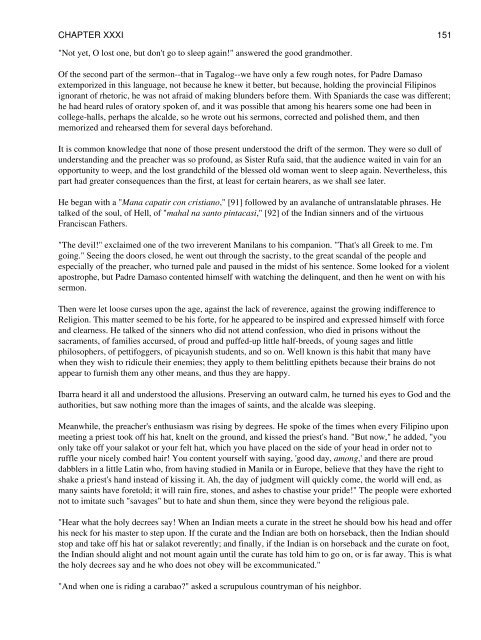The Social Cancer, by José Rizal - Home
The Social Cancer, by José Rizal - Home
The Social Cancer, by José Rizal - Home
Create successful ePaper yourself
Turn your PDF publications into a flip-book with our unique Google optimized e-Paper software.
CHAPTER XXXI 151<br />
"Not yet, O lost one, but don't go to sleep again!" answered the good grandmother.<br />
Of the second part of the sermon--that in Tagalog--we have only a few rough notes, for Padre Damaso<br />
extemporized in this language, not because he knew it better, but because, holding the provincial Filipinos<br />
ignorant of rhetoric, he was not afraid of making blunders before them. With Spaniards the case was different;<br />
he had heard rules of oratory spoken of, and it was possible that among his hearers some one had been in<br />
college-halls, perhaps the alcalde, so he wrote out his sermons, corrected and polished them, and then<br />
memorized and rehearsed them for several days beforehand.<br />
It is common knowledge that none of those present understood the drift of the sermon. <strong>The</strong>y were so dull of<br />
understanding and the preacher was so profound, as Sister Rufa said, that the audience waited in vain for an<br />
opportunity to weep, and the lost grandchild of the blessed old woman went to sleep again. Nevertheless, this<br />
part had greater consequences than the first, at least for certain hearers, as we shall see later.<br />
He began with a "Mana capatir con cristiano," [91] followed <strong>by</strong> an avalanche of untranslatable phrases. He<br />
talked of the soul, of Hell, of "mahal na santo pintacasi," [92] of the Indian sinners and of the virtuous<br />
Franciscan Fathers.<br />
"<strong>The</strong> devil!" exclaimed one of the two irreverent Manilans to his companion. "That's all Greek to me. I'm<br />
going." Seeing the doors closed, he went out through the sacristy, to the great scandal of the people and<br />
especially of the preacher, who turned pale and paused in the midst of his sentence. Some looked for a violent<br />
apostrophe, but Padre Damaso contented himself with watching the delinquent, and then he went on with his<br />
sermon.<br />
<strong>The</strong>n were let loose curses upon the age, against the lack of reverence, against the growing indifference to<br />
Religion. This matter seemed to be his forte, for he appeared to be inspired and expressed himself with force<br />
and clearness. He talked of the sinners who did not attend confession, who died in prisons without the<br />
sacraments, of families accursed, of proud and puffed-up little half-breeds, of young sages and little<br />
philosophers, of pettifoggers, of picayunish students, and so on. Well known is this habit that many have<br />
when they wish to ridicule their enemies; they apply to them belittling epithets because their brains do not<br />
appear to furnish them any other means, and thus they are happy.<br />
Ibarra heard it all and understood the allusions. Preserving an outward calm, he turned his eyes to God and the<br />
authorities, but saw nothing more than the images of saints, and the alcalde was sleeping.<br />
Meanwhile, the preacher's enthusiasm was rising <strong>by</strong> degrees. He spoke of the times when every Filipino upon<br />
meeting a priest took off his hat, knelt on the ground, and kissed the priest's hand. "But now," he added, "you<br />
only take off your salakot or your felt hat, which you have placed on the side of your head in order not to<br />
ruffle your nicely combed hair! You content yourself with saying, 'good day, among,' and there are proud<br />
dabblers in a little Latin who, from having studied in Manila or in Europe, believe that they have the right to<br />
shake a priest's hand instead of kissing it. Ah, the day of judgment will quickly come, the world will end, as<br />
many saints have foretold; it will rain fire, stones, and ashes to chastise your pride!" <strong>The</strong> people were exhorted<br />
not to imitate such "savages" but to hate and shun them, since they were beyond the religious pale.<br />
"Hear what the holy decrees say! When an Indian meets a curate in the street he should bow his head and offer<br />
his neck for his master to step upon. If the curate and the Indian are both on horseback, then the Indian should<br />
stop and take off his hat or salakot reverently; and finally, if the Indian is on horseback and the curate on foot,<br />
the Indian should alight and not mount again until the curate has told him to go on, or is far away. This is what<br />
the holy decrees say and he who does not obey will be excommunicated."<br />
"And when one is riding a carabao?" asked a scrupulous countryman of his neighbor.


